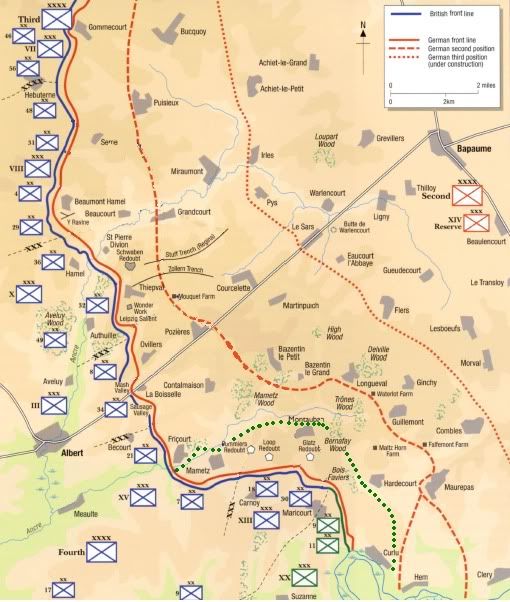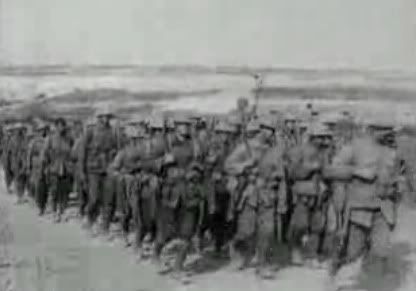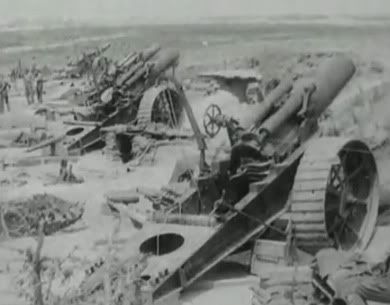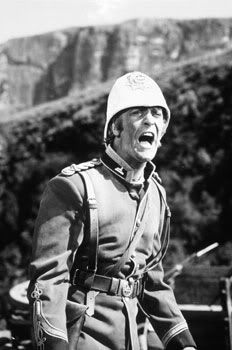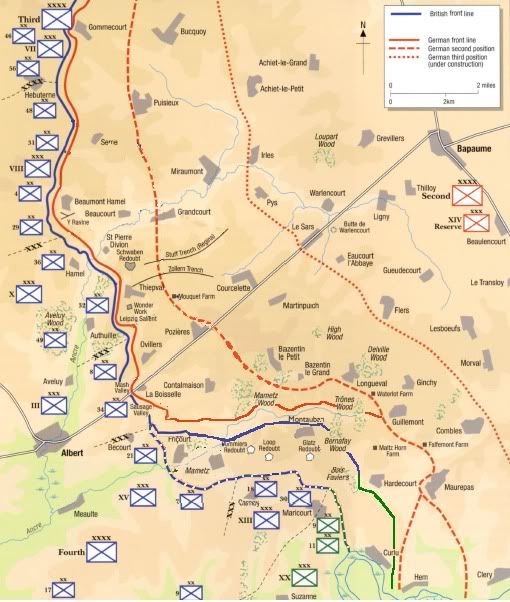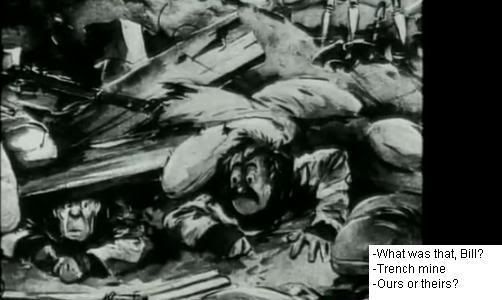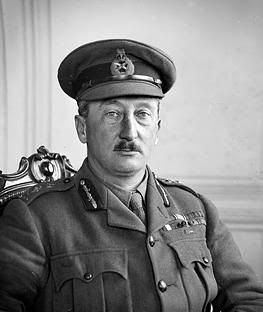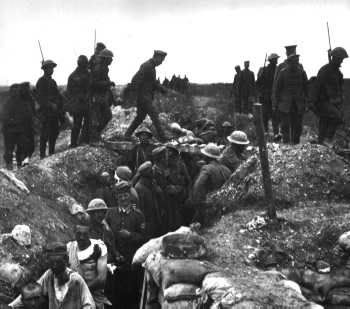Chapter thirty-eight: Calvary sharpening their Swords
The Somme front after July 14th. The blue dots mark the Allied line at the beginning of the offensive. Although the area between Hardecourt and Malt Horz Farm may look undefended, it is not so. The Germans have laid a discontinuous line made up by dugouots, shell holes and small trench lines that make quite difficult -but not impossible- any British attack there.
Once the mysterious colonel -who was not a Zombie- arrived to France, Haig and Rawlinson met to arrange a new attack. Scheduled for July 14th, it aimed at capturing the German second defensive position which ran along the crest of the ridge from Pozières, on the Albert–Bapaume road, south-east towards the villages of Guillemont and Ginchy. The objectives were the villages of Bazentin le Petit, Bazentin le Grand and Longueval, which was adjacent to Delville Wood.
Following a surprise five-minute artillery bombardment, four divisions were to attack on a front of 6,000 yards (5.5 km) before dawn at 3:25 a.m. The artillery laid down a creeping barrage, and the attacking waves pushed up close behind it in no man's land, leaving them only a short distance to cross when the barrage lifted from the German front trench. Once the breakthrough was achieved, some elements of the 2nd Indian Cavalry Division would seize High Wood. Haig wasn't quite optimistic about the plan, as he did not trust the British infantry (and some members of the staff) to be disciplined or trained enough to carry out a night attack. Suddenly, the meeting became a funny inversion of the initial stages of the planning of the First Day of the Somme, with Rawlinson suggesting further and further advances and releasing a whole calvary division through the breakthrough, while Haig tried unsuccessfully to restrain the enthusiasm of his general. It was then when the unnamed colonel called for a pause, as his dog needed to make some exercise. After asking a perplexed Rawlinson to come with him, the colonel went out with the general and the dog. What happened in that pause remains still a mistery, but Haig had some idea, as he wrote in his diary the following words: “
R. got treatment number one. Poor old bugger. That dog is a killer.” Apparently, the pause helped Rawlinson to make up his mind, and he suggested that it would be wiser to forget about the cavalry action.
The attack went as planned originally: after the bombardment -by far, the heaviest weight of shell fired by the British so far for the lengh of trench attacked-, the infantry went over the top. The creeping barrage allowed the British soldiers to cross No Man's Land with light casualties, although some units suffered from the heavy fire by a few surviving machine guns. Despite of this, the entire German front system had fallen shortly after zero hour and by midday Rawlinson's troops had secured the German second line and had captured the villages of Bazentin le Petit and Longueval and Trônes Wood, but were stopped in front of Waterlot Farm. Here should have ended the attack, which had been a moderate success, so far.
Then, fate struck.
Trench warfare as seen by “The Punch”.
Apparently, although the whole operation had been modified, the orders given to some squadrons of the Secunderabad Cavalry Brigade (7th Dragoon Guards and the 2nd Deccan Horse, names from a past era) were not cancelled and they charged through the weatfield betweeen High Wood and Longueval. They immediately ran into machine gun fire from Delville Wood and High Wood and were struck by an artillery barrage fired from Flers. Nevertheless, they managed to spear sixteen Germans with their lances (certainly, one of the strangest episodes in all of the fighting on the Western Front and sixteen of the unluckiest victims) before being forced to dismount and take up defensive positions. This episode cost them ten men killed and wounded and 138 horses. Thus ended cavalry participation for the rest of 1916. In the words of 2nd Lieutenant F.W. Beadle, a forward observation officer for the artillery who witnessed the charge:
It was an incredible sight, an unbelievable sight, they galloped up with their lances and with pennants flying, up the slope to High Wood and straight into it. [...] They simply galloped on through all that and horses and men were dropping on the ground, with no hope against the machine guns, because the Germans up on the ridge were firing down into the valley where the soldiers were. It was an absolute rout. A magnificent sight. Tragic.
While Haig was furious for this shameful event, Rawlinson argued that if two regiments could charge with success (one may wonder what Rawlinson meant by success... if advancing and falling back to their initial positions is a success, then July 1st was the biggest victory of the British Army ever) for 1,000 yards into unprepared German defences, a further two brigades arriving early enough could have advanced even further, taking the German positions at Longueval and Delville Wood in the rear. If Haig had reasons to dislike the idea of having Rawlinson commanding the operation, after this comment he decided to get rid of that "turbulent" general, at least partially. Thus, he had an idea.
General Sir Hubert de la Poer Gough GCB, GCMG, KCVO, the eldest son of Sir Charles John Stanley Gough VC, GCB, nephew of General Sir Hugh Henry Gough, VC, and brother of Brigadier-General John Edmund Gough, VC (the only family to ever win the Victoria Cross, the highest award for bravery, three times).
On July 2, Haig relieved Rawlinson's Fourth Army of responsibility for the northern sector, and put the two northern corps of the Fourth Amy (VIII and X) under the command of General Sir Hubert Gough, and designated the Reserve Army. A veteran of the Boer War -where he had led the relief column during the siege of Ladysmith-, Gough had been the leader of the infamous Curragh Mutiny -in which a number of British Army officers said that they would rather resign rather than enforce the Government's plans to implement the Irish home rule-. A favourite of General Haig -Gough was an offensive minded cavalryman who believed in attacking at all costs-, he experienced a meteoric rise through the ranks during the war and now Haig had plans for him: Gough was to take Thiepval and Pozières.
However, Haig was puzzled. When he had stated his intention, the unnamed colonel had grinned widely and congratulated him for "the greatest idea since Harold Godwinson went for a fishing excursion..." and said no further words. That grin and the vicious smiles of the dog made him fear that something odd was to happen. However, for the moment he was to be very busy preparing the new stage of the offensive.
Bringing in German prisoners on July 14th, 1916.
By the way, my loyal Peti has made me aware of some notable losses (and nearly misses) for the British since the beginning of the war (BEWARE: Some butteflies had made a bit of changes in the fates of the following historical -and true- characters. Sometimes the butterflies are not to blame. Just my wicked sense of humour

).
Cecil Abercrombie (1886-1915), a Scottish rugby union player and an English first-class cricketer, died on 31 May 1915 at sea during the Battle of the Channel, while serving on HMS Diamond which was sunk during the battle after a huge explosion with all hands. (1)
Rear-Admiral
Sir Robert Keith Arbuthnot, 4th Baronet, KCB, MVO (1864 – 1915), died on 31 May 1915 at sea during the Battle of the Channel, while serving on HMS Diamond, in circumstances described by Admiral of the Fleet Lord Fisher as "a glorious but not a justifiable death" (2)
Raymond Asquith, 2nd Earl of Oxford and Asquith, MC and bar (1878 – 1936), eldest son and heir of British Prime Minister H. H. Asquith by his first wife Helen Kelsall Melland. Commander of a company of the 3rd Battalion, Grenadier Guards, was injured in the first day of the Somme and has been sent back to England. He was to return to France in time to do his bit against the Hu, though.
John Jacob Astor, 1st Baron Astor of Hevee (1866-1971), born the fourth child of William Waldorf Astor, 1st Viscount Astor. He served in the Life Guards when he was slightly injured by shrapnel during the battle of Loos. After recovering from his injuries in England, Astor was posted to India, to become, again Aide-de-Camp to Baron Hardinge, Viceroy of India (he had already fulfilled that task with Hardige between 1911 and 1914).
Horatio Pettus Mackintosh Berney-Ficklin (1892-1961). Awarded the Military Cross on June 3, Berney-Fickling became breveted Major of the 8th Battalion Norfolk Regiment, 53rd Brigade, 18th "Eastern" Division, on 1 July 1916. That very day, during the attack against the Schwaben Redoubt, he was injured by a stray bullet. For a time, Berney-Ficklin had serious troubles to sit down, but he recovered fully from his wounds.
Captain
Fergus Bowes-Lyon (1889 - 1915), an older brother of Elizabeth Bowes-Lyon, who will (or won't) marry Albert, Duke of York, the second son of King George V and Queen Mary. He served with the 8th Battalion, Black Watch and was killed in the opening stages of the Battle of Loos.
Rupert Brooke (1887 – 1915), poet. He was killed in a Corner of a Foreign Field in Northern France when his unit, the Royal Naval Division, was deployed in Belgium to defend the coastline.
Edward Frederick Lindley Wood, 1st Earl of Halifax, KG, GCSI, GCMG, GCIE, PC (1881– 1959) served as a Lieutenant-Colonel in 1915 of the staff of the Queen's Own Yorkshire Dragoon Yeomanry when he was wounded by German shrapnel. Back in the trenches, it is claimed that this promising officer may become aid-de-camp of General Haig. (3)
Brigadier-General John Edmund Gough, VC (1871 - 1935), Haig’s principal staff officer when Haig was given command of the newly created British First Army, he's now in England recovering from a griveous wound in the abdomen, after beign hit by a German sniper. It's hoped that he would be soon back to France (and he, along with our unnamed colonel, may cause some efect upon Haig -no harm intended to good old Lieutenant-General Launcelot Kiggelll, though).
Talbot Mercer Papineau, MC (1883– 1965), a lawyer and soldier from Quebec, Canada. In August 1914, he enlisted with Princess Patricia's Canadian Light Infantry and was commissioned a lieutenant. He became famous through an exchange in newspapers in 1916 he argued with his cousin, the anti-imperialist nationalist leader Henri Bourassa, over support for the war and the British Empire. During the figthing of the "Black October" of 1915, he was heavily wounded and sent back to Canada.
Allan MacDonald (1892 – 1915), he joined the Australian Imperial Force and served at the Gallipoli Campaign until he died from blood poisoning.
Alfred Roberts (1892 – 1916). When World War I broke out in 1914, Roberts, "a deeply patriotic man", applied to enlist in the army five times but was rejected because of his poor eyesight. As he attempted for the sixth time, he was accepted and send to France as part of the Royal Army Medical Corps. He died on the First Day of the Somme when he was helping the wounded in the trenches under heavy enemy fire, when he was hit on the head by a stray bullet (4).
Hastings Russell (1888 – 1914). Son of Herbrand Russell, 11th Duke of Bedford, he was serving as a Lieutenant in the 10th Battalion, Middlesex Regiment, when he contracted blood poisoning by early August, died a fortnight later. His father fought in in the Great War, where he was mentioned in dispatches.
Gilbert Sackville, 8th Earl De La Warr (1869-1915). A Temporary Lieutenant with the Royal Naval Volunteer Reserve, was killed in the same action that saw the death of Brooke.
James Herbert Wilson (1882–1914) a chemist who had been active in the Liberal Party and then joined the Labour Party. He was killed during the Scarborough Raid. Apparently, he was paying a inspection visit to the chemical depots of that northern seaport town when Fritz came to town... (5).
(1) Abercrombie died in OTL Jutland, but I fear that, after the trashing received on the Channel, the Kaiser is not going to risk his fleet again, so, no Jutland.
(2) Arbuthnot went with his cruiser squadron into a mad dash to attack the German battlecruiser line at Jutland and, of course, he got wiped out. Defence was destroyed in a massive magazine explosion and went down with all 903 hands aboard -Arbuthnot included.
(3) What can I say? I'm a bitch. Worse to come, no panic.
(4) I hope that there's no need to say who's got butterflied into oblivion... I know, Pippy... Halifax survives, Maggie goes AWOL for good... It's a hard life...
(5) Well, Maggie wasn't the only one to get butterfield





Happy now, Trekkie?
@Enewald: Not in the mood, sorry.
@quaazi: No, it's the return of common sense.
@c0d5579: Time will tell. Or not...
@quaazi: Nothing so evil...
@FlingDutchie: It's curious, but I don't want to sack Haig. In part because I don't know who would replace him...
@El Pip: No, Sir Maurice is not in charge of the British War Effort. Perhaps the Britons will choose him when Asquith goes home and Lloyd Georges goes nuts trying to win the war .
@Nathan Madien: Not here. This is not gaiasabre11's
French Mod 1914 Alternate History AAR (1897- ?) Les Flammes des Ténèbres and there are no zombies fooling around, trust me. I haven't invited Dr. Helen Magnus to the party, sorry.
@Davout: Darnt. My training with Sir Humphrey Appleby taught a lot about that, but I forgot...
 (Nivelle offensive comes to mind, surely).
(Nivelle offensive comes to mind, surely).

